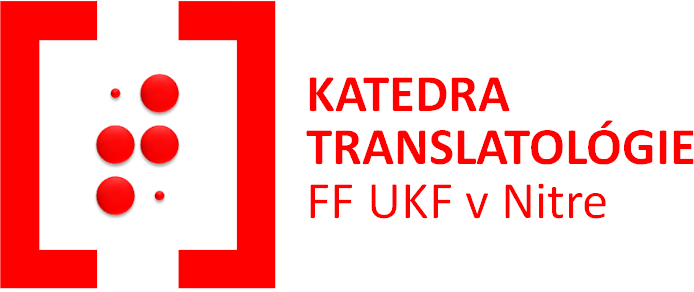On 29 and 30 January 2024, the Department of Translation Studies of the Faculty of Arts of the Constantine the Philosopher University in Nitra organised the 12th International Scientific Conference for PhD students and young researchers Tradition and Innovation in Translation Studies Research, this year subtitled Bridging Cultures and Communities through Translation Studies.
Thanks to the online format of the conference, PhD students and other researchers from all over the world had the opportunity to contribute with their participation and research. The participation was high, both in numbers of presenters and viewers. During the two days, three keynote speakers had the opportunity to pass on their inspiring insights, and they were complemented by 16 young researchers from different parts of the world. In addition to European countries, there were participants from countries such as the USA, China, Australia, and New Zealand.
The event started with the speech by the Dean of the Faculty of Arts of the Constantine the Philosopher University in Nitra, prof. PhDr. Martin Hetényi, PhD. He emphasised the importance of development of languages and the significance of translation and interpreting for society. In the following speech the participants were addressed by the Head of the Department of Translation Studies, doc. Mgr. Emília Perez, PhD., who appreciated the long tradition of the conference and motivated all participants to further creative work. The opening of the conference was concluded on behalf of the organisers by Mgr. Eva Verebová, who pointed out the importance of cooperation and its beneficial results.
The keynote speaker of the first conference day was prof. Luc van Doorslaer. In his inspiring presentation, he explained why travellers translate, even if they don’t. His views gave all participants a new perspective not only on translation as such, but also on the interconnectedness of cultures.
A fruitful discussion was followed by a translation sociology section, which was in many ways connected to the professor's lecture. Participants had the opportunity to learn about bad practices in the language services industry, about the problems of translating political or dialectical language, and also about how culture influences the perception of a work of art.
The last section of the day was dedicated to Audiovisual translation, Accessibility, didactics, and interpreting. PhD students and researchers analysed interpreting internships, the possibilities of sign language interpreting provision, the accessibility of theatrical performances for people with hearing impairment, and experimental teaching methods in relation to the D/deaf and hard of hearing. The section concluded with a duo of researchers discussing the intersection of translation studies and language didactics.
The second day started with a lecture by the keynote speaker, professor Minako O’Hagan who joined the conference all the way from New Zealand. In her engaging presentation, she talked about technology in translation, its historical development and potential use for a preferred future. Her insight pointed the participants in the right direction in terms of their use. The keynote speech was followed by two presentations from young researchers. The first focused on the facets of video game translation with respect to the user, and the second on the impact of machine translation post-editing on the work of project managers.
The next section continued with the theme of translation and technologies. The special guest of the conference, Adrian Probst, shared his experience from the translation practice. In his presentation, he talked about the technologies he works with on a daily basis. After the presentation, he was interviewed by Mgr. Andrej Birčák about current topics from the translation market. Adrian Probst concluded the interview with words of encouragement and motivation for the future.
The last section focused on specialised translation and interpreting. The audience listened to lectures on the provision of remote interpreting in Slovakia, the influence of emotional language on the perception of texts by young people, and the role and competence profiles of translators in Portuguese speaking countries and in Slovakia.
At the end of each section, there was a discussion about the presentations, in which the participants as well as the audience were involved. Their comments always led to new insights and provided a new point of view on the subject.
The conference was concluded on behalf of the organisers by Mgr. Lenka Žitňanská. She thanked the keynote speakers, presenters, the scientific committee, the audience, and the entire organising team. She especially thanked the students of the Department of Translation Studies for interpreting the whole event. She highlighted that the conference offered a wealth of information on a wide range of topics in which everyone found something that interested them. Finally, she expressed the desire to meet all the participants next year.


